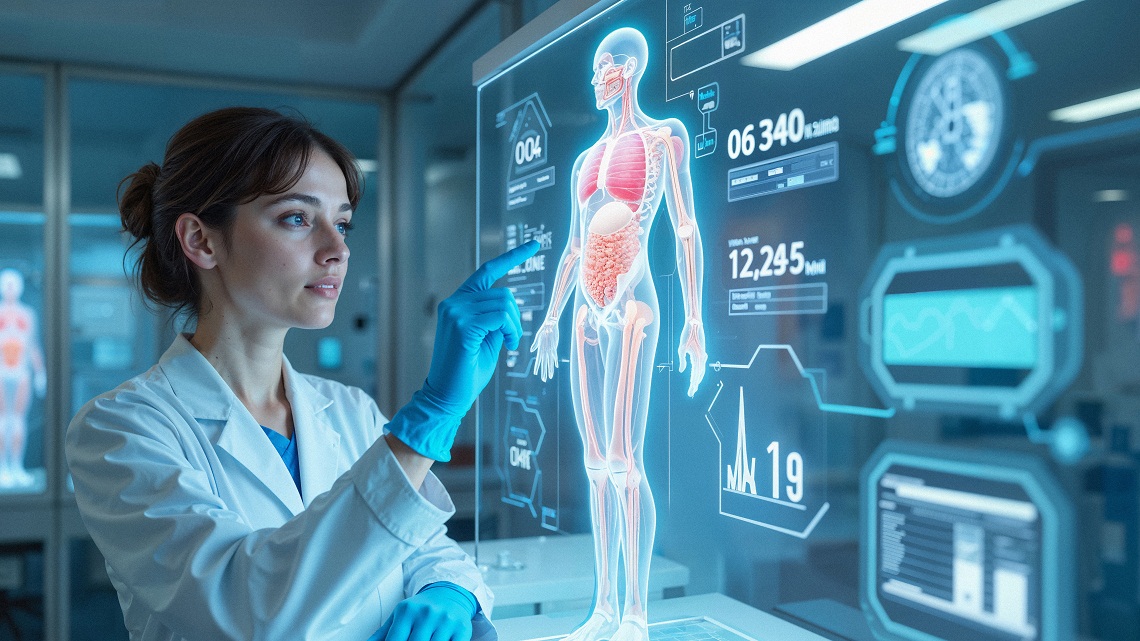
The healthcare industry is being revolutionized in its very core, spurred by heightened demand for intelligent, data-driven solutions. The rise of chronic diseases, increasing older populations, and with the demand for advancements in the industry, the usual approach no longer serves the edge. Healthcare professionals are now looking to artificial intelligence (AI) as the key to improving clinical outcomes, streamlining operations, and raising patient experiences.
AI is not solely a technology but rather an ensemble of smart systems that possess the capability to learn, reason, sense, and communicate. Healthcare AI is already a game changer—it automates routine tasks to save lives through diagnosis. This blog investigates the various types of AI technologies that are transforming the healthcare of this day and age and what potential benefits removing constraints in the industry.
Types of AI technologies shaping modern healthcare
- Natural Language Processing (NLP): Unlocking the Value of Clinical Text
Using natural language processing helps systems comprehend human language by facilitating computer reading and analysis. Particularly, interpreting the unstructured clinical data such as electronic health records (EHRs), radiology reports, and documentation of a physician.
Major Applications:
- Automated clinical documentation
- Summary of patient history in real time
- Detection of trends in population health data
- Improving voice-to-text applications for providers
NLP significantly helps to reduce the level of clinician burnout and maximizes the effectiveness and utility of medical observations marked in text records.
- Machine Learning (ML): Predictive and Precision-Driven Intelligence
Machine Learning technology analyzes from previous data records and discovers patterns, predicts, and progressively enhances performance without explicit instruction.
Key Applications:
- Patient readmission or deterioration prediction
- Personalized recommendation of treatment
- Risk scores for management of chronic diseases
- Improvement of drug discovery and clinical trial optimization
ML facilitates evidence-based decision-making, facilitating quicker, more targeted interventions which can make a big difference in clinical outcomes.
- Computer Vision: AI for Medical Image Analysis
Computer vision uses deep learning models to analyze and interpret medical images with accuracy generally on the level of expert clinicians.
Main Applications:
- X-ray, CT scan, MRI, and pathology slide anomaly detection
- Support for cancer detection (e.g., lung cancer, breast cancer, skin cancer)
- Anatomical structure measurement and segmentation automatically
Computer vision renders diagnostic pipelines and helps lower error rates, especially in the verticals of radiology, dermatology, and pathology.
- Expert Systems: Rule-Based Decision Support
Expert systems are AI models and logic rules with clinical knowledge bases that provide structured decision support based on pre-determined guidelines.
Applications of high criticality:
- Clinical decision support (CDS) systems
- Triage and symptom checker tools
- Medication interaction alerts
- Protocol adherence monitoring
However, comparatively less interactive than ML, expert systems provide reliability and transparency, which are essential in highly regulated environments.
- Robotic Process Automation (RPA): Streamlining Health Operations
Robotic process automation is facilitated through software robots, executing repeated, rule-based administrative processes at high speed and accuracy.
Key Applications:
- Claims processing, billing automation
- Scheduling, appointment reminders
- Insurance verification and prior authorizations
- Legacy system data integration and migration
RPA allows the workforce to spend less time on patient-care activities by transferring administrative burden.
- Generative AI: Redefining Clinical Communication and Research
Generative AI models are large language models (LLMs), generating new content—text, image or data—based outputs for the purpose of communication or research.
High-featured applications:
- Clinical note, discharge summary, and patient instruction composition
- Robotic literature review and synthesis of research
- Improving chatbot conversation for patient engagement
- Synthesizing synthetic patient data to train and test
Generative AI introduces communication effectiveness and facilitates scalable clinical documentation, especially in time-constrained environments
- Synergistic AI: Integrating Multiple AI Types for End-to-End Solutions
The way forward is synergistic AI solutions—combining several AI competencies (e.g., NLP + ML + computer vision) into integrated, context-sensitive solutions. A synergistic AI solution is beneficial to scan medical images (computer vision), relevant history from EHRs (NLP), and define personalized treatment suggestions (ML). all within a single support interface. Integration of an end-to-end machine intelligence, care providers are able to streamline informed and quicker decisions with complete contextual awareness, enabling for accurate and optimized workflows.
Advantages of AI in Healthcare
The application of AI technology provides multi-modal value:
- Improved Diagnostic Accuracy
Imaging and pathology AI programs enable earlier and more consistent detection of conditions and minimize human error.
- Faster Clinical Decision-Making
The ability to process vast volumes of data in real time, AI facilitates data-driven, accelerated and more assured decision making, particularly in emergency or high-acuity environments.
- Operational Efficiency
Automating eliminates administrative burden, minimizes processing time, and saves operational expense in billing, records, and scheduling.
- Personalized Care
AI facilitates precision medicine by treatment according to patient-specific profiles—genetic, environmental, and behavior.
- Expanded Access
AI powered virtual assistants, triage robots, or AI tools for remote patent monitoring etc. are improving overall access to care, especially for rural or underserved populations.
- Data Utilization
AI translates raw health data into meaningful insights, fueling ongoing quality improvement and better population health management.
Conclusion
Healthcare AI is no longer a theoretical concept. Integration of AI types significantly accelerates operational effectiveness and improves patient care. The facility to analyze insights, automate, and deliver accuracy in results revolutionizing decision-making and medical service provision. Predictive analytics and intelligent automation to image diagnosis, AI enables smarter, more responsive healthcare. Those organizations that invest in AI ethically and strategically will rule the industry with value, quality and innovation in healthcare. The future of healthcare is not only digital—its human effort combined with machine intelligence.
For more articles, visit The Healthcare Insights.
